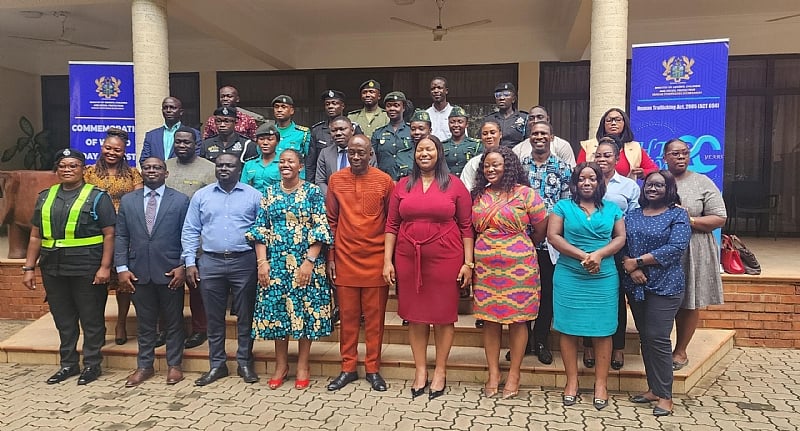The Ministry of Gender, Children and Social Protection has commenced a two-day intensive capacity-building workshop in Accra aimed at equipping law enforcement officers with comprehensive knowledge on human trafficking and irregular migration.
The training, which brings together personnel from key security agencies, is focused on enhancing the participants’ understanding of the fundamental concepts of human trafficking, child labor, the worst forms of child exploitation, and distinctions between migrant smuggling and trafficking. It also covers emerging trends such as the Q-Net scam, techniques in identifying and investigating trafficking cases, and effective application of Ghana’s Human Trafficking Act in prosecuting labor and sex trafficking offenses.
Delivering a keynote address on behalf of the Minister for Gender, Children and Social Protection, Hon. Dr. Agnes Naa Momo Lartey, the Head of the Human Trafficking Secretariat, Abena Annobea Asare, underscored the urgency of the initiative.
She described human trafficking as one of the most pervasive and destructive crimes of modern times, which often goes unnoticed despite occurring in broad daylight and being closely linked to irregular migration.
“Traffickers thrive by exploiting vulnerabilities such as poverty, conflict, and lack of opportunity. They lure victims through deception, coercion, and abuse of power, ultimately entrapping them in cycles of exploitation,” she noted.
The Ministry, according to her, has over the years prioritised capacity building and has successfully trained 1,750 law enforcement officers drawn from the Ghana Police Service, Ghana Immigration Service, the Economic and Organised Crime Office (EOCO), and the Customs Division of the Ghana Revenue Authority. These efforts, she explained, are critical in the ongoing fight against trafficking and exploitation across the country.
She highlighted some recent breakthroughs achieved by Ghanaian authorities. One such instance was a collaborative operation between the Ghana Police Service’s Anti-Human Trafficking Unit and Interpol, which led to the rescue of 66 Ghanaian citizens trafficked to Nigeria under false pretences of recruitment into football and other jobs. The victims were subjected to exploitative conditions between May 19 and June 27, 2025, before they were rescued.
Another major success came from EOCO, which arrested 35 suspects and rescued over 219 trafficking victims, mostly Nigerians and other West Africans, who had been confined and forced into cybercrime and labour exploitation in Oyarifa, a suburb of Accra. Furthermore, a joint operation between Ghanaian and Ivorian authorities, with support from Interpol, led to the rescue of 33 West African victims from Abidjan, Côte d’Ivoire. These individuals, including some Ghanaians, had paid up to $9,000 each after being deceived with false job offers and subsequently coerced into scam operations.
Abena Annobea Asare stressed that combating human trafficking requires collective effort. “No single agency can effectively address this menace. It demands coordinated action from government institutions, civil society, community leaders, and international partners. We must all commit to protecting the vulnerable and prosecuting the perpetrators,” she urged.
In a statement delivered by Director of the unit, DSP William Ayaregah, on behalf of the Director-General of the Criminal Investigations Department, DCOP Lydia Yaako Donkor expressed appreciation to the Ministry of Gender for organising the training, describing it as a timely and necessary initiative to empower security agencies with practical knowledge and tools to combat trafficking.
She reassured stakeholders of the Ghana Police Service’s unwavering commitment to its mandate in tackling human trafficking. “This initiative strengthens our collective resolve. We will continue to work with our partners to eliminate human trafficking in all its forms from our society,” she emphasised.
Participants at the workshop praised the Ministry for the initiative. Assistant Superintendent of Immigration (ASI) Obeng Prince from the Ashaiman Sector Command described the training as an eye-opener that would help officers recognise and respond more effectively to trafficking cases.
Detective Chief Inspector Florence Ocansey from the Weija Division echoed similar sentiments, stating that the training had provided her with invaluable insights into the patterns and signs of trafficking and would enhance her work in the field. “The sessions are practical and enlightening. It’s important that more officers across the country receive this type of training,” she added.


